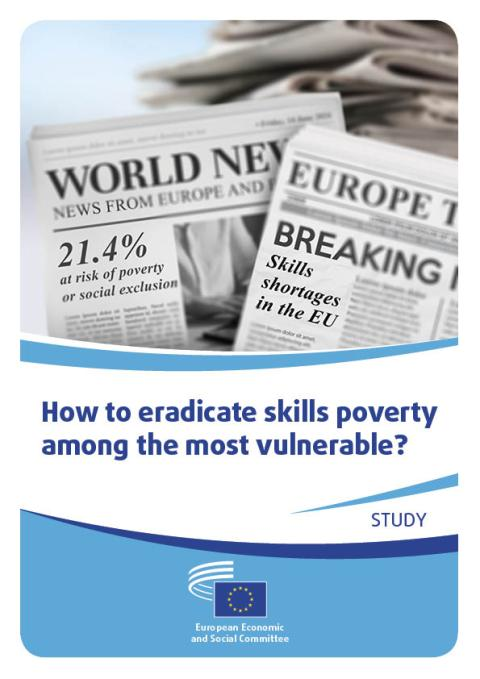 Homepage CASE
Homepage CASE
Selected values

How to eradicate skills poverty among the most vulnerable?
-

Agnieszka Maj
Economist
Agnieszka Maj is an Economist at CASE. She holds an MA degree in International Economic Relations from Cracow University of Economics. Currently, she is obtaining an MA in Gender Studies – Intersectionality and Change at Linköping University. During her education (on both BA and MA levels) she participated in numerous exchange programs at the University … <a href="https://case.dev10.pro/publications/how-to-eradicate-skills-poverty-among-the-most-vulnerable/">Continued</a>
Articles from this author:
-
Blueprint and Methodology for Innovative Governance
The publication is a key deliverable within the BioBeo project, funded under the Horizon Europe program. It provides a structured approach to integrating bioeconomy education into school curricula across different institutional and social environments. The report examines the actors involved in curriculum decision-making, from policymakers and school administrators to parents, students, and businesses. It categorizes existing procedures for introducing new content into schools, whether initiated by teachers, school heads, or government authorities. Key barriers—legal, organizational, and socio-cultural—are identified, along with strategies to overcome them. A central theme is the importance of inclusive governance in education, advocating for participatory decision-making that involves various stakeholders. Recommendations highlight the need for flexibility in curriculum design, adequate funding, professional support for teachers, and depoliticization of educational content. The report concludes by situating these findings within the broader BioBeo curriculum framework, reinforcing the role of education in fostering a sustainable and circular bioeconomy.
-
Affordable Sustainable Housing in the EU
The study commissioned by the European Economic and Social Committee, examines strategies to address the pressing challenges of housing affordability and sustainability across the EU. It focuses on two key areas: the role of digitalization in the housing sector and the contribution of social economy initiatives. Key findings include: Digitalization's Role: The study highlights how tools like Building Information Modelling (BIM) and AI can streamline planning, improve energy efficiency, and enhance building management. Case studies from Denmark, France, and the Netherlands illustrate successful digital solutions. Social Economy Contributions: Localized, community-oriented housing solutions, like cooperatives and social rental agencies, demonstrate the value of non-profit initiatives in creating affordable, resilient, and sustainable living environments. Examples include projects in Austria, Poland, and Spain. Policy Recommendations: Medium-term goals (by 2030) include harmonizing EU-wide housing policies and integrating digital platforms. Long-term strategies (by 2050) emphasize developing inclusive housing models and leveraging digital innovations. The study concludes that addressing housing issues requires a holistic approach, combining economic, environmental, and social strategies while fostering cooperation among local, national, and EU stakeholders.
-
Natural disasters: anticipatory governance and disaster risk management from a local and regional perspective
Climate change poses a significant challenge across the European Union, with increasing climate-induced hazards threatening ecosystems, economies, and public well-being. Local and Regional Authorities (LRAs) play a crucial role in addressing these risks due to their close connection to affected communities. Effective Climate Change Adaptation (CCA) strategies must be tailored to local needs, yet many regions face challenges like limited resources and expertise. Proactive crisis management, integrated with Disaster Risk Management (DRM), is essential to prevent future crises. By using strategic foresight tools, LRAs can better prepare for risks, allocate resources effectively, and build community resilience. However, challenges remain, including financial constraints, trust issues and ensuring equity for vulnerable groups. To overcome these obstacles, LRAs should focus on inclusive governance, citizen engagement, and data-driven decision-making. As climate hazards intensify, integrating CCA with DRM at the local level will better equip communities to withstand and recover from climate impacts. Collaborative efforts and capacity-building are key to a resilient future.
-
Blueprint and Methodology for Innovative Governance
-

Delia Agostinelli
Economist
Delia Agostinelli is a Junior Economist at CASE. Graduated cum laude in Economics and Economic Policy at the University of Bologna with a thesis entitled “Impact of skilled migration on human capital formation and growth performance of source countries“. At CASE, Delia is involved in projects related to green economy, energy policies as well as … <a href="https://case.dev10.pro/publications/how-to-eradicate-skills-poverty-among-the-most-vulnerable/">Continued</a>
Articles from this author:
-
E-services for citizens at local and regional level in EaP countries
This study was prepared as part of a project on E-services for citizens at local and regional level in EaP countries commissioned by the European Committee of the Regions (CoR) under the specific contract No CDR.17081 implementing multiple framework contract for studies in the field of external relations No CDR/2022/B3/1/1-CIVEX-RELEX. The aim of the study … Continued
-
Making the EESC the facilitator and guarantor of participatory democracy activities
This study looks at the Conference on the Future of Europe’s (CoFoE) proposals on European democracy and the role of the European Economic and Social Committee (EESC). It explores different options for institutional reform of the EESC to best serve its purpose and increase citizens’ participation. To do this, the study examines different forms of … Continued
-
Addressing the challenges of the smart, sustainable and inclusive growth in national Recovery and Resilience Plans: a preliminary assessment
This briefing paper provides an initial analysis of selected measures proposed by Germany, France, Italy and Poland in their respective Recovery and Resilience Plans (RRPs), and focuses on the areas of competitiveness, business environment /entrepreneurship, and (re)industrialisation. As the analysis has shown, targets and milestones set for the majority of the analysed measures seem to … Continued
-
E-services for citizens at local and regional level in EaP countries
-

Izabela Marcinkowska
Labor market, social policy, and employment director
Dr. Marcinkowska's areas of expertise include the labor market, social policy, and employment. As President of the Management Board, Dr. Marcinkowska is responsible for managing all research and projects in the areas of demography, labor, and social policy, overseeing CASE’s financial administration, and spearheading new business development activities. Dr. Marcinkowska has been cooperating with CASE since 2005, and has participated in numerous Polish and international technical assistance and research projects, including the multi-year MOPACT (Mobilizing the Potential of Active Ageing in Europe) Project, funded by the European Commission’s DG on Research and Innovation; NEUJOBS – Employment 2025: How will multiple transitions affect the European labor market, also funded by the European Commission’s DG on Research and Innovation; the Study on the effects and incidence of labor taxation, funded by the European Commission’s DG on Taxation and Customs Union, and Assessing Needs of Care in European Nations (ANCIEN), funded by the European Commission’s Health Cooperation Program. Dr. Marcinkowska obtained her PhD in Economic Science on Informal Employment from the University of Turin. She holds an MA in Economics from the University of Warsaw and an MA in Economics from CORIPE Piemonte in Turin. She has published extensively in the fields of labor economics, social policy, and health economics.
Articles from this author:
-
Tourism and rural development
The study delves into the multifaceted impact and potential of tourism in fostering rural development across the European Union (EU). Its aim is to equip local governments with practical insights, empowering them to effectively leverage the benefits of tourism in rural EU regions. Employing a diverse array of research methodologies, including interviews, case studies, and … Continued
-
Energy policy and the labour market: consequences for employment in regions undergoing energy transitions
This study examines the socio-economic situation of three lignite regions in the process of transitioning out of coal mining: Lusatia in Germany, Wielkopolska in Poland, and Upper Nitra in Slovakia. It assesses the effectiveness of various instruments, factors and approaches in creating quality jobs, employment, and economic growth. The research results suggest that a successful … Continued
-
The cost of non-rurality – preparing for a better urban-rural balance in EU funding
A balanced urban-rural policy is central to successful regional development efforts. There have been several definitions of what could constitute an urban-rural balance (or imbalance), yet measures of actual ‘costs of non-rurality’ remain elusive. Since the Industrial Revolution, debates on this ‘balance’ centred on the shift from agricultural labour to industrial and service centres. This … Continued
-
Tourism and rural development
Related publications
Thanks for joining us!
You're now part of a community that values [your newsletter's focus]. Get ready to stay informed, inspired, and engaged with our carefully curated content.
